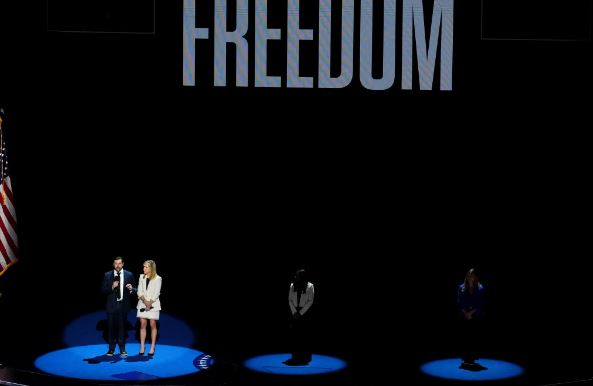In the two years following the Supreme Court’s decision to overturn Roe v. Wade, the national debate over abortion rights has intensified. The voices of women who have been denied abortions under restrictive state laws have become increasingly prominent, serving as powerful advocates for Democratic candidates across the country. Their personal stories, often filled with tragic and harrowing details, have not only been shared in interviews and campaign ads but have also taken center stage at major political events like the Democratic National Convention in Chicago.
One such story came from Amanda Zurawski, who, along with her husband Josh, bravely recounted her near-death experience after going into premature labor at 18 weeks. Due to Texas’s near-total abortion ban, Amanda was turned away from a hospital, as her condition did not meet the strict legal criteria for an abortion. The law only allows for the procedure if the mother’s life is immediately threatened, leaving doctors in a position where they could not intervene until Amanda’s health deteriorated further. On stage, Amanda spoke with emotion about the baby girl she and her husband had desperately wanted but lost. She expressed the deep pain of being denied critical medical care and the fear that her husband felt as her life hung in the balance. Despite the heartbreak of telling her story, Amanda vowed to continue advocating for abortion rights, hoping to prevent others from enduring similar suffering.
Kaitlyn Joshua shared her own traumatic experience of being denied care during a miscarriage in Louisiana. Kaitlyn described how she was in excruciating pain and bleeding heavily, yet was turned away from two hospitals due to fears of legal repercussions under the state’s restrictive abortion laws. The uncertainty surrounding the legal boundaries of providing care has left many women, like Kaitlyn, in a precarious situation, unsure whether they can seek the medical help they need. Kaitlyn’s story resonated with many who have faced similar experiences, and she emphasized the importance of ensuring that women receive the care they deserve.
Perhaps the most emotionally charged testimony came from Hadley Duvall, a survivor of childhood sexual abuse. Hadley, who was raped by her stepfather, spoke about the trauma of potentially being forced to carry a pregnancy to term at the age of 12. Her words were especially powerful when she addressed former President Donald Trump’s description of abortion bans as a “beautiful thing.” Hadley directly challenged this notion by asking what could be “beautiful” about a child being forced to give birth to her rapist’s child. Her question left the convention floor in stunned silence, highlighting the deep emotional impact of these restrictive abortion laws.
Since the Supreme Court’s ruling in 2022, public support for abortion rights has steadily increased. The decision, which was facilitated by Trump’s appointment of three conservative justices, has ignited a wave of voter concern over reproductive rights. This growing concern was a significant factor in the stronger-than-expected performance of Democratic candidates in the 2022 midterm elections. Recognizing the importance of this issue, the Harris campaign has made it a central theme in their messaging, aiming to galvanize voters by highlighting the real-world consequences of restrictive abortion laws.
The stories of Amanda Zurawski, Kaitlyn Joshua, and Hadley Duvall, all of whom have previously appeared in campaign ads for Democratic candidates, serve as powerful reminders of the stakes in the ongoing debate over abortion rights. Their willingness to share their personal tragedies in the public arena has helped keep the issue of reproductive rights at the forefront of political discourse. As the country moves toward the next election, these women’s stories will continue to shape the conversation, reminding voters of the real-life impact of these policies.
Their testimonies are not just political statements; they are deeply personal accounts that humanize the issue and underscore the urgency of protecting reproductive rights. As the fight for abortion rights continues, the voices of women like Amanda, Kaitlyn, and Hadley will remain critical in advocating for change and ensuring that their experiences are not forgotten.

